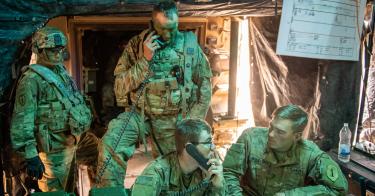Ever had a major expense pop up? Perhaps your car’s transmission fails, or the sewage line from your house to the county line gets clogged and everything backs up into your basement. Or you catch a virus that puts you in the hospital for a couple of weeks.
All these have happened to me. Oddly, the larger world outside my home didn't pause.
The bank still expected me to make my mortgage payment. My boss still expected progress on a major project. Homework assignments and sporting events still needed supervision and attendance. Just because a surprise crisis demanded my utmost attention didn’t mean that anything else changed to accommodate my situation.
The same thing is true for the United States, our COVID-19 crisis and the state of global affairs.
As the cost of pandemic response rises in the United States, we're hearing calls to reallocate military spending to domestic matters. Arguments used to justify this proposal include the usual litany of criticisms: DOD is rife with waste, fraud and abuse; the military services are wedded to archaic approaches and tools; America has overly militarized its engagement with the world; de-fanging America’s military will incentivize other countries to reduce their militaristic adventurism resulting in a world at peace.
Moreover, we’re told the money taken from defense will be effectively spent on social programs that improve the lives of Americans without risking those lives in any way because the rest of the world will accommodate America’s reprioritization.
It is all utter nonsense.
China, Russia, Iran, North Korea, and a host of terrorist and criminal groups long for a world in which the U.S. turns inward and reduces its military to a regional force versus one capable of global action. America’s allies, trading partners, and the many countries who have benefitted from America's stand against brutal, expansionist, authoritarian regimes fear that same world.
Americans have benefitted from 30 years of peace and prosperity, the happy result of a strong United States that maintained the strength and confidence to stand-up to the Soviet Union for four decades from the end of World War II to its collapse. Free of the fear of major conflict, the U.S. and its partners have been able to invest, invent, build, produce, trade, travel and improve their circumstances. Obviously not without disruptions and disputes and even terrorist attacks, but certainly without concern about a major war that threatened the destruction of everything.
But a side effect of this extended period of peace is complacency, and the further we get from a time of existential threat, the easier it becomes to forget what it took—and what it still takes—to maintain the life we have.
We have the luxury of complaining about mask-wearing while shopping because we have not had to fear for the destruction of Europe, the loss of markets in Asia, or the vaporizing of an American city.
Do people really believe that China will stop trying to impose its will on the Indo-Pacific region? That Iran will recant its desire to eliminate Israel because the U.S. decides to reduce its military in favor of expanded social programs? That Russia will stop its efforts to break apart NATO, that North Korea will divest itself of nuclear weapons or the Islamic State will stop beheading Christians because the United States determines that it is too expensive to have competent military pilots flying modern aircraft?
There is an unavoidable cost to being a superpower. Our military today is two-thirds (or less) the size it was when the United States led the world in standing against the Soviet Union. Today, it is expected to do the same against more competitors armed with the latest military capabilities, but with equipment largely purchased in the 1990s and a budget not keeping pace with the cost of inflation or the increasing complexity of war in the modern age.
The U.S. military is challenged to modernize and regain the operational competence it once had for major conventional conflict, while also having to account for new forms of war as robotics, artificial intelligence, cyber, and other advanced tools mature.
Has the COVID-19 pandemic taken a toll on America and will it continue to do so for some time to come? Absolutely. But will the rest of the world conveniently pause its activities if America decides to deal with challenges at home and reduce its ability to deal with those abroad? Of course not.
This is not an either/or proposition. To be a global power and to continue enjoying the relative peace, prosperity, influence, and deterrence we have in the past, America must do both.
Defense of our country and our way of life is one of the very few obligations specifically assigned by our Constitution to the federal government. Abrogate that and everything else is put at risk. Everything.
This piece originally appeared in The Washington Times



